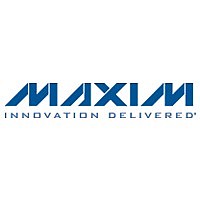MAX2003 Maxim Integrated Products, MAX2003 Datasheet - Page 10

MAX2003
Manufacturer Part Number
MAX2003
Description
Nicd/nimh Battery Fast-charge Controllers
Manufacturer
Maxim Integrated Products
Datasheet
1.MAX2003.pdf
(20 pages)
Available stocks
Company
Part Number
Manufacturer
Quantity
Price
Company:
Part Number:
MAX2003
Manufacturer:
MAX
Quantity:
5 510
Part Number:
MAX2003A
Manufacturer:
MAXIM/美信
Quantity:
20 000
Company:
Part Number:
MAX2003ACSE
Manufacturer:
MAXIM
Quantity:
20
Company:
Part Number:
MAX2003ACSE
Manufacturer:
MAXIM
Quantity:
5 510
Company:
Part Number:
MAX2003ACSE
Manufacturer:
Frontier
Quantity:
5 510
Part Number:
MAX2003ACSE
Manufacturer:
MAXIM/美信
Quantity:
20 000
Part Number:
MAX2003ACWE
Manufacturer:
MAXIM/美信
Quantity:
20 000
Part Number:
MAX2003APA
Manufacturer:
MAXIM/美信
Quantity:
20 000
Part Number:
MAX2003CSE
Manufacturer:
MAXIM/美信
Quantity:
20 000
operation, the SNS voltage ramps between 0.044V
and 0.050V
is 5V (Figure 7). The average voltage at SNS, therefore,
is 235mV, and can be used to calculate the charge cur-
rent as follows:
where R
charge current required.
In some applications (shown later), SNS is tied directly
to ground. In these cases, the MOD pin remains on
until any one charge-termination condition is exceeded
(Figure 8). A reasonable external current limit (such as
a current-limited DC source) must be provided for
these applications, to prevent battery damage due to
excessive charge currents.
The MAX2003 has several charge-termination methods.
The termination method selected depends on the type
of battery and charge rate used. Table 1 summarizes
the conditions used to terminate fast-charge with differ-
ent battery types and charge rates.
NiCd/NiMH Battery
Fast-Charge Controllers
Figure 7. Current Regulation with an SNS Resistor
10
0.050
0.044
I
MOD
LOAD
I
SNS
V
V
V
______________________________________________________________________________________
BAT
CC
CC
CC
0
0
0
SNS
CC
is the sense resistor and I
, which is 220mV and 250mV when V
I
CHARGE
FAST CHARGE
Circuits without SNS Resistor
= 0.235V / R
Charge Termination
SNS
CHARGE
FAST-CHARGE
TERMINATE
TIME
TIME
TIME
is the
CC
CC
The Temperature Rate Termination (∆T/∆t) method ter-
minates fast-charge when a particular rate-of-change in
temperature is exceeded. As the battery begins fast-
charge, its temperature increases at a slow rate. When
the battery nears full capacity, this rate of temperature
change increases. When the rate of temperature
change exceeds a preset number, fast-charge is termi-
nated. This method of fast-charge termination can be
used for both NiCd and NiMH batteries.
The MAX2003 samples the voltage at the TS pin every 34
seconds and compares it with a value taken 68 seconds
earlier. Since an NTC thermistor is used for temperature
measurements, a gradual rise in temperature will result in
successively lower voltage readings. If the new reading is
more than 0.0032V
reading, fast-charge is terminated.
The MAX2003A varies the sampling interval as a function
of charge rate (Table 4). As the charge rate increases,
the sampling interval decreases, thereby allowing more
accurate termination of fast charge.
Note: This method of charge termination is valid only
when the battery’s temperature is between V
V
Figure 8. Current Regulation without an SNS Resistor
TCO
0.050
0.044
I
MOD
LOAD
(Figure 5).
I
V
SNS
V
V
BAT
CC
CC
CC
0
0
FAST CHARGE
CC
SNS = 0V
(16mV for V
Temperature Rate Termination
CC
= 5V) below the old
FAST-CHARGE
TERMINATE
TIME
TIME
TIME
LTF
and












